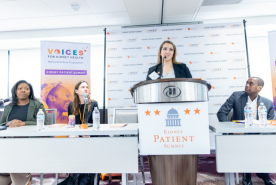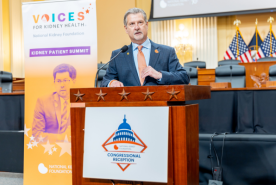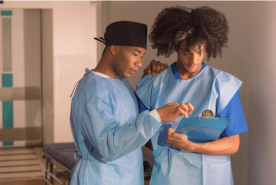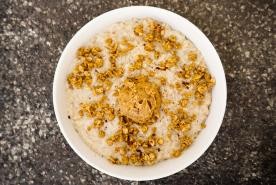June 03, 2020
By Risa Simon, NKF patient advocate and founder of The Proactive Path and Transplantfirst Academy; and Michael Stevenson, NKF National Board Member and patient advocate.
As kidney patients we adhere to routine lab draws, whether we like it or not. Add COVID-19’s unpredictability factor and anxieties can soar. The thought of standing in line with others in a waiting room is cause for concern — especially the immunosuppressed. But postponing lab draws can result in dangerous risks. Because of this, kidney patients have become somewhat betwixt and between about timely lab draws.
A Patient Experience
While some lab locations have ramped-up precautions, others have shut down or repurposed themselves exclusively for COVID-19 testing. Mike Stevenson, a kidney transplant recipient and NKF advocate from Columbus, Ohio, was very concerned when his pharmacy told him that he had to show evidence of a current lab draw before they would refill his immunosuppressant medications.
While Mike was anxious about going in for labs, he realized he didn’t have much choice. Fortunately, Mike reported, “My experience was better than I thought it would be. I was instructed to send a text upon my arrival and wait in my car until they directed me to enter the lobby wearing a mask. As luck would have it, I was the only patient there.” Mike also mentioned his phlebotomist was the only other person in the lab and that she was wearing gloves and a mask.
Communication & Preparedness
Be sure that you ask your lab about their precautions and if they can accommodate any special needs you have. If you need to go to new facility, always consider the new preparations. Infection control practices have always been important in the lab and CDC guidelines regarding COVID-19 precautions must be strictly adhered without exception.
Wearing masks and donning a new pair of gloves prior to the actual cleaning, palpation, and penetration of the injection site is even now more important. While social distancing cannot be followed during the draw, all supplies must be accessible to avoid cross-contamination.
If you’re not convinced that your lab will be as smooth or as careful as Mike’s, we have a few suggestions for you. These include making a call to your local lab to interview them about their COVID-19 protocols. Be sure they are still providing normal lab services, offering COVID-safe protections, and haven’t added COVID testing. If their answer doesn’t give you the peace of mind you were hoping for, you might want to consider some “outside-the-lab-box” alternatives.
Living Outside the “Lab-Box”
One option could include using a mobile lab draw service, where a certified phlebotomist is dispatched to draw your blood in the “comfort zone” of your home. Home lab draws can eliminate long lines, lengthy waiting room stays and potential exposure to other patients and workers.
Need more safeguard assurance? Consider the “drive-thru-open-window”technique. In this scenario, the patient can position themselves inside their car in their garage or on even on the pavement in their driveway. The patient is seated on the correct side of the car for the arm they choose to use while wearing a mask. Then their preferred arm can be placed on top of a plastic covered pillow (or freshly laundered rolled-up towel) over the open window’s ledge.
Getting orders to a mobile lab can be quite simple. Either the patient (or the ordering physician) contacts the mobile lab to request an appointment. The mobile lab will then request the physician’s order and that the patient’s insurance card be faxed or emailed. Typically, the patient will be required to set up an account online and pay the “draw-fee” in order to confirm the time and location of the draw. Be sure to interview the lab and inform them about your concerns and preferences. On the day of the appointment, a phlebotomist will meet the patient at the specified time and location to collect the samples.
Keep in mind that mobile lab “draw-only” fees aren’t typically covered by medical insurance, and on average run about $65 per home visit. Fees for all tests ordered by a doctor will be billed as usual to the patient’s insurance company.
Keep Yourself Safe!
As the pandemic continues to run its course and states reopen their economies, look after your health! Staying safe is the most important thing you can do. If you need more advice or support, please check NKF’s COVID-19 resource page where they post all the latest information on issues facing the kidney community and watch their Facebook Live discussion series. Consider also contacting NKF’s patient helpline at 855.NKF.CARES (855.653.2273) or nkfcares@kidney.org.
Risa Simon is a preemptive kidney transplant recipient who will be celebrating 10 years of transplant success (and going strong) on June 8, 2020. In addition to volunteering as an NKF peer mentor and advocate, Risa is the founder of The Proactive Path and Transplantfirst Academy where she inspires fellow kidney patients to proactively secure their best life possible –the life Risa now lives. The one word that best describes Risa: “Grateful.”
Mike Stevenson received a kidney from his brother in 1996 after being diagnosed with glomerulonephritis and has been a proponent of trying to cure chronic kidney disease since. Mike serves on the Board for the Central Ohio, division of the National Kidney Foundation and also serves on the National Kidney Foundation Board.


















